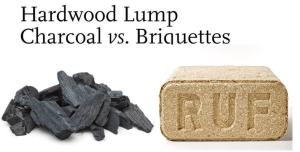Hardwood Charcoal vs Wood Briquettes: Choosing the Ideal Fuel for Grilling and Barbecuing
When it comes to grilling and barbecuing, selecting the right fuel is essential for achieving optimal results. Hardwood charcoal and wood briquettes are two popular options that offer distinct advantages. In this article, we will compare hardwood charcoal and wood briquettes to help you make an informed decision based on your grilling needs. Discover the differences, benefits, and unique features of these fuel options to elevate your grilling experience. Many people have been asking the difference between Hardwood charcoal and Wood briquettes, follow below.
-
Composition and Production Process:
Hardwood charcoal is made by heating wood in the absence of oxygen, resulting in charred and carbonized wood. It is typically made from natural hardwoods like oak, hickory, or mesquite. Wood briquettes, on the other hand, are compressed blocks of sawdust, wood chips, or other wood residues. They are produced by compressing the wood particles with additives or binders to form consistent and uniform briquettes.
-
Heat Output and Cooking Performance:
Hardwood charcoal is renowned for its high heat output and intense, smoky flavor. It reaches high temperatures quickly, making it ideal for searing and achieving a charred crust on meats. The intense heat of hardwood charcoal is well-suited for quick grilling sessions. Wood briquettes, on the other hand, provide a more controlled and even heat. They burn for a longer duration, making them suitable for longer cooking times, such as slow smoking or low-and-slow barbecue.
-
Burn Time and Consistency:
Hardwood charcoal tends to burn faster compared to wood briquettes. The quick-burning nature of hardwood charcoal makes it convenient for spontaneous grilling sessions or when you need immediate heat. On the other hand, wood briquettes offer a longer burn time, allowing for extended cooking periods without the need for frequent fuel replenishment. Their consistent size and composition ensure a steady heat supply throughout the cooking process.
-
Flavor and Aromatics:
Hardwood charcoal imparts a distinct smoky flavor to grilled foods, creating a desirable barbecue taste. The unique aroma and flavor profiles of different hardwoods contribute to the overall grilling experience. Wood briquettes, while they may lack the intense smokiness of hardwood charcoal, offer a milder and more neutral flavor. This can be advantageous when you want the natural flavors of the food to shine or when you prefer to add smoke flavor through additional methods like wood chips or chunks.
-
Ash Production and Cleanup:
Hardwood charcoal typically produces less ash compared to wood briquettes. The low ash production of hardwood charcoal reduces the need for frequent ash removal during grilling sessions. Wood briquettes, due to their composition and additives, may generate more ash. However, many modern wood briquettes are designed to minimize ash production, making cleanup easier and more convenient.

Choosing between hardwood charcoal and wood briquettes depends on your grilling preferences, cooking style, and desired flavor profile. Hardwood charcoal offers intense heat, quick cooking, and a distinctive smoky flavor, making it ideal for high-temperature grilling. Wood briquettes provide a longer burn time, even heat, and versatility for slow smoking or extended barbecuing sessions. Consider the specific requirements of your grilling endeavors and experiment with both options to find the perfect fuel that suits your taste and cooking techniques. Elevate your grilling experience with the ideal fuel choice, whether it be hardwood charcoal or wood briquettes.